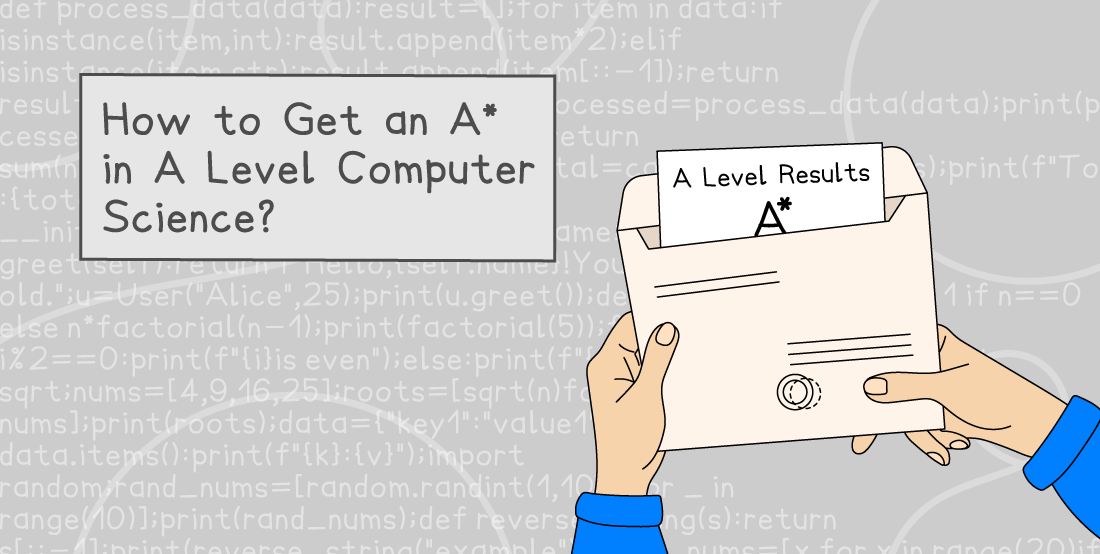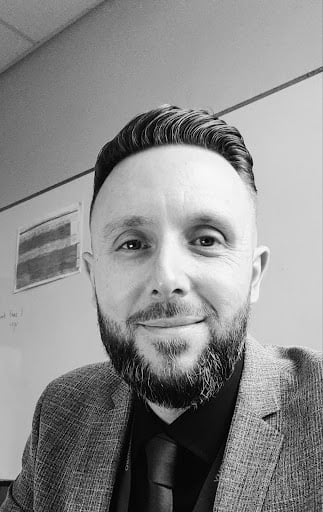How to Get an A* in A Level Computer Science
Written by: Robert Hampton
Reviewed by: James Woodhouse
Published

Contents
Want to know how to get an A* in A Level Computer Science? You're in the right place. This guide reveals proven strategies that go beyond just revision.
Whether you're aiming for top marks or pushing yourself into the A* bracket, this article will show you what truly sets apart the highest-performing students. From mastering exam technique to thinking like a computer scientist, these tips will give you the edge in both your coursework and final exams.
Know the spec inside out
Too many students revise without knowing exactly what they need to learn. The first step towards an A* is understanding your exam board specification line by line. That means being able to answer these questions for every topic:
What are the key definitions and vocabulary?
What kinds of questions are likely to be asked?
How is each point assessed; is it theory, practical, or both?
Turn each spec point into a quiz question or flashcard. This forces you to actively process the information and identify gaps.
Nail your programming skills
Computer Science is a unique subject, it's not enough to just know theory. To get an A*, you need to be confident, fluent, and fast at programming.
Practice problem-solving regularly (not just big coursework projects).
Learn your language's built-in functions and libraries.
Revisit the basics: loops, subroutines, arrays, file handling, until they’re second nature.
WHILE TRUE
OUTPUT "Enter a number (-1 to quit): "
INPUT number
IF number = -1 THEN
OUTPUT "Goodbye!"
BREAK
ENDIF
IF number MOD 2 = 0 THEN
OUTPUT "That number is even."
ELSE
OUTPUT "That number is odd."
ENDIF
ENDWHILE
Use past paper questions with coding tasks. Break them down, solve them by hand, then code the solution. Speed and accuracy count in the real exam.
Master exam technique
Even students who understand the content sometimes drop marks because of poor exam technique. Here’s how A* students approach the paper:
Highlight command words like "explain", "describe", "compare" — they tell you how to answer.
Plan long answers before you write. Use keywords from the mark scheme.
Practice timed papers to build exam stamina and reduce stress.
For long-answer questions, use a structure like PEEL (Point, Evidence, Explanation, Link) to stay clear and focused.
Don’t just learn, teach
Teaching others is one of the best ways to deepen your understanding. If you can explain a concept clearly, you really get it.
Try this:
Start a revision group and take turns teaching topics.
Write simplified notes for someone one year below you.
Record short videos explaining a concept and watch them back critically.
Try explaining recursion to a non-CS friend. If they understand it, you’ve nailed it.
Use your coursework to boost your grade
Your NEA (Non-Exam Assessment) is a major chance to shine. It’s worth 20% of your final grade, and A* students maximise this opportunity.
Pick a project that stretches you but fits within your ability.
Keep your code clean, commented, and well-tested.
Spend serious time on your evaluation, this is where many students miss easy marks.
Use your spec to guide each section of your write-up. Treat it like a checklist.
Common Mistakes to Avoid
Even the most hard-working students can fall into traps that hold them back from achieving an A*. Avoiding these mistakes could be the difference between an A and an A* in A Level Computer Science.
1. Focusing too much on memorisation
While it’s important to know your definitions and theory, Computer Science is not just a memory test. Students who try to rote-learn the content often struggle to apply it in unfamiliar contexts, especially in long-answer or logic-based questions.
Instead of just memorising, focus on applying your knowledge. For example, don’t just learn the definition of a binary search. Code one, trace it by hand, and explain it to someone else. The examiners want to see that you can use what you know, not just repeat it.
2. Leaving programming practice too late
It’s easy to prioritise theory-heavy topics when revising, but programming confidence takes time to build. Students who delay this often panic during the NEA or when faced with programming logic in the exam.
The top students practise programming little and often. Even 15 minutes a day can make a difference. Focus on solving small problems such as string manipulation, file handling, or recursion, and revisit them regularly. Waiting until the NEA deadline or the final term to improve your coding is a common and costly mistake.
3. Ignoring past papers until the end
Too many students treat past papers like a final mock test, something to save for the very end of revision. But they are actually one of your most powerful learning tools and should be part of your preparation from the beginning.
Doing past papers early helps you understand how questions are structured, spot recurring topics, and get familiar with timing and command words. Don’t just do the paper and move on. Mark it using the official mark scheme, analyse where you lost marks, and identify how to improve. This kind of active review is what pushes students into the A* range.
Boost Your Grades With Save My Exams
Feeling stressed ahead of your exams? Join over 1.5 million students who use Save My Exams, the leading online revision platform.
On average, students who use Save My Exams improve by two grades thanks to our comprehensive resources. From past papers and revision notes to exam-style questions tailored to your specific course, our revision tools help you to study smarter, not harder.
Created by teachers and examiners who know exactly what you need to revise to achieve the best grades, our resources help students to save time and get straight to the content you need.
Sign up for articles sent directly to your inbox
Receive news, articles and guides directly from our team of experts.

Share this article


 written revision resources that improve your
written revision resources that improve your